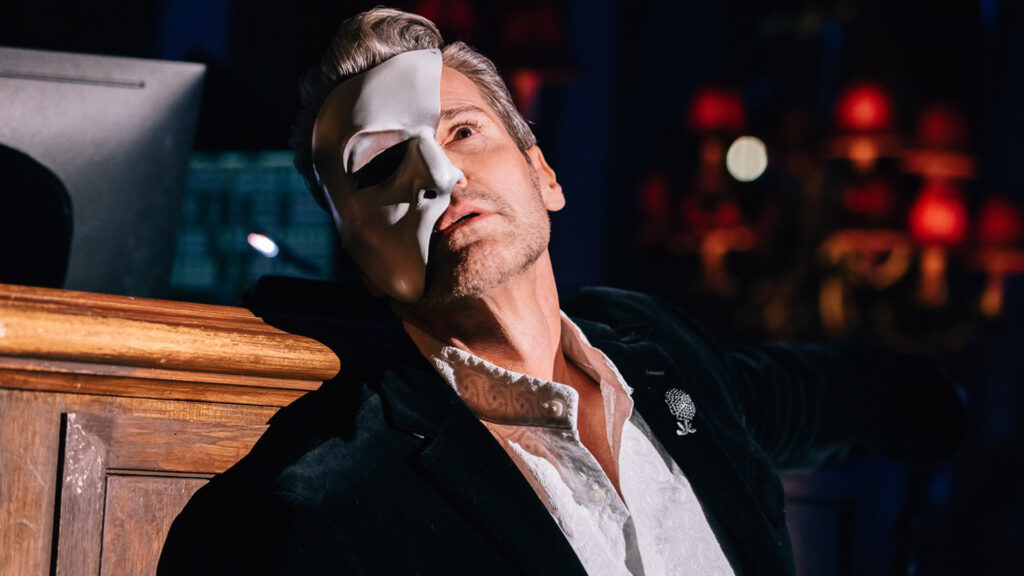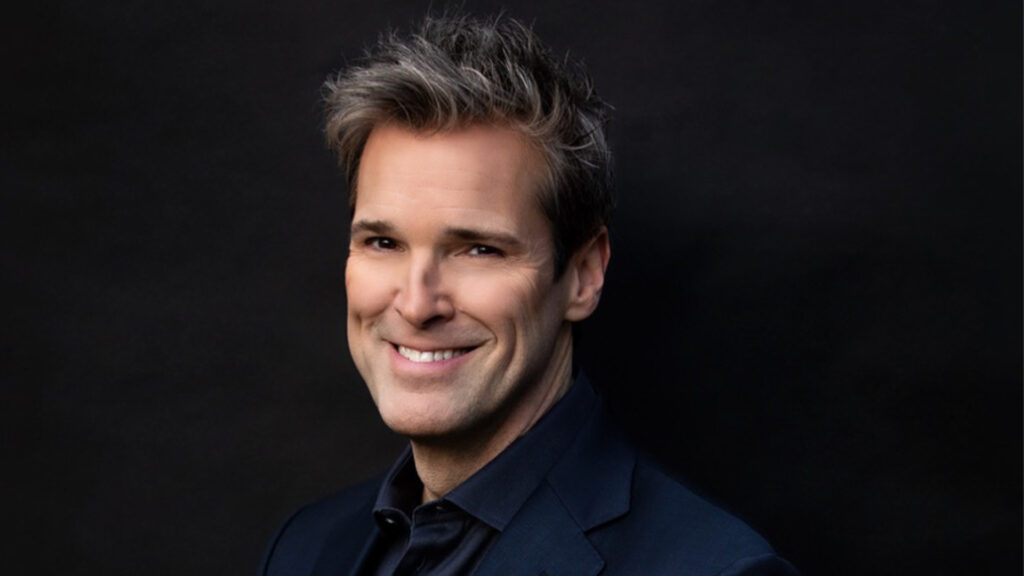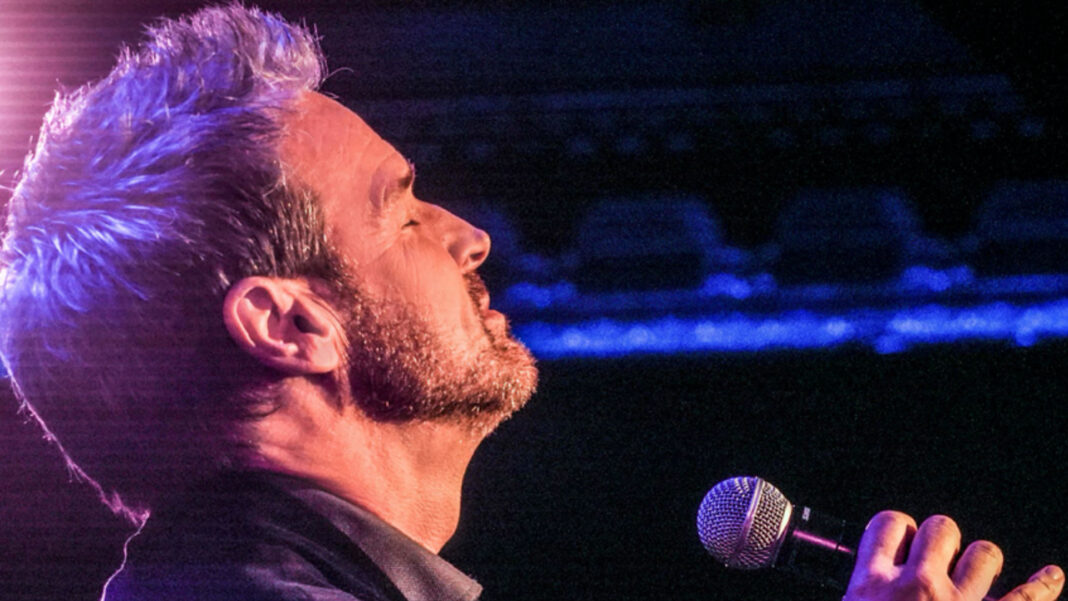Broadway star Hugh Panaro is best-known for his over 2,200 performances as The Phantom aka Erik in Andrew Lloyd Webber’s musical. But he’s also performed the role of Raoul in that show. He’s also played Marius in Les Misérables and originated roles in four ill-fated musicals: The Red Shoes, Side Show, Martin Guerre and Lestat.
He’s appeared in multiple Stephen Sondheim shows (including Merrily We Roll Along, A Little Night Music and Sweeney Todd). In fact, his list of credits is far more robust than you might think. But it’s Phantom for which he’s best known. Which is why his cabaret show is called Hugh Panaro: The Man Without the Mask.
Panaro brings the show to Feinstein’s at the Hotel Nikko on November 29th and 30th; Catalina Jazz Club in Hollywood on December 5th and the Palm Springs Cultural Center on December 7th.
Given his vast career, we had plenty to talk about earlier this week. What follows are excerpts from that conversation that have been edited for length and clarity. To see the full interview, please go to our YouTube channel (where you’ll be able to hear many more stories, his impersonation of Mandy Patinkin and get his recipe for the perfect Negroni).

Q: Andrew Lloyd Webber told Charles Spencer in The Telegraph in 2013, “What strikes me is that there’s a very fine line between success and failure. Just one ingredient can make the difference.” What do you think is that one ingredient that you have that has made a difference for you in your career?
That’s a great question. I think if I have one good trait, I think I can be objective. I’ve always known when I’ve done a bad audition and I usually know if I’ve done a good audition. I’ve gotten better at it, as I’ve gotten older, I think, to be more objective and hopefully not be too delusional. Really kind of see myself, hopefully, the way other people can see me.
As an actor this far into your career, can you own that you did the best in any given situation and not worry about the result?
That’s where I would put my money where my mouth is. Whenever I do masterclasses with young people, I always tell them the same thing. The best thing you can do is be the most authentic version of yourself so that people see you. Don’t try to be somebody else that you’re not. When I first moved to New York, Mandy Patinkin was it. I was obsessed. I thought he’s just best thing on two legs. I thought they wanted Mandy Patinkin. So I would go in a lot of times and do my best, what I thought they were looking for.
It wasn’t until this really smart piano player, musical director, I should say, Michael Biagi. [He] didn’t know me from Adam. He saw me out and he said, “You know, if they want Mandy, they’re going to get Mandy. You need to figure out who you are. Bring that to the table and some people are going to like it. Some people are not. But at least they’ll know who they’re hiring.” It was the best advice anyone ever gave me.
The Man Without the Mask started in New York at 54 Below. How has the show evolved since you first did it?
It is definitely evolved. I will take you back another 2.0 version. The first time I had done something like this was actually in Palm Springs. My musical director, Joseph Thalken, and I put something together and we were having fun. My friend, and now director, Richard Jay Alexander, came to see the show. He did say, “You know, I think you need a director. And if you’re interested, I’d like to talk to you.”
He goes, “You have a career and you need to really focus on that and bring people up to date of your own musical journey.” There were a lot of things that we just didn’t put in the show because, I don’t know, I guess I thought it was not interesting or people would think it was old fashioned. That was when Richard hopped on board. Then Joseph and I and Richard went into a rehearsal studio and just sang through everything you can possibly imagine. There were so many songs that just didn’t make the cut, because you can’t keep people there for 4.5 hours.
You have a recording of the show. Do you think fans come to see you hoping to hear that in person or do you want to offer them more?
I always say that the CD we released is a very good template for what people are going to see, but it always changes a little bit based on a couple of things. I do like to sing everything and stay all night and sing them, but some venues are very strict with [time]. I also had guest stars. So we had to go, what two songs from Man Without a Mask can we live without? We would change the show every single night.
For instance, at Catalina, my dear friend Lisa Vroman has said yes to singing with me. We’re going to get to do a reunion moment together [they were both in Phantom of the Opera]. Obviously we can’t go all night, so we’ll probably have to trim some numbers. But with Catalina, I believe there’s only one show that night, so I might go long.
The musical Annie introduced you to the world of professional musical theater. I believe that Sweeney Todd introduced you to the world of musical theater as religion. You tell a great story about Len Cariou doing “Epiphany” and jumping down with his knife right to the lip of the stage when you saw the show. When you have a memory as profound as that, how does that influence how you approach a role that many decades later you performed (at Barrow Street Theatre off-Broadway)?
Len Cariou was my Sweeney. He’s who I saw. I was taken to see that show. My mom said, “Hughie, you need to see this woman. Her name is Angela Lansbury.” I don’t know how she pulled it off, but we had house seats and I was about the fourth or fifth row on the aisle. Len literally leapt. I mean, he didn’t leap. He flew from Mrs. Lovett’s pie shop down to the lip of the stage and looked at me with his razor and scared the heck out of me.
I couldn’t just imitate Len. I had to find my Sweeney. What can you bring to the role? It was very interesting because Bill Buckhurst was our director. He started it in London at the little pie shop and came to New York. I had auditioned for Bill on Zoom because he was in London. They sent a lot of videos to him because I lobbied for this role. It was not something that they were beating my door down to hire me. I said, I am willing to trust you completely.
He’s like, “Hugh, you’re very goofy, gregarious and very quick to smile. That does not work for my vision of Sweeney. Every time I see Hugh, I’m going to clock you if I can see even like the beginning of charm or the beginning of smile.” One of the greatest compliments I got was from a friend of mine that said we didn’t recognize you in this role because you were so dark and dead inside. It’s kind of fun playing a crazy person.
As long as you can leave it at the stage door and go home and not take it home.
I only played the role for about six months and they asked me to renew and I probably would have. But one of the things I had to do to really embody this character, I had to get my voice so low and a real bass baritone. For six months I lived down there. I would go around literally growling and keeping my larynx in a really low position. I realized by keeping my voice down there for so long, I started to lose a lot of my top notes. That is kind of my bread and butter. I had a really honest talk with them. I said, I would love to stay as long as you would have me, but I don’t want to get into a situation where I have vocal issues from doing this. I’m really struggling with my high notes that used to fall out of my mouth easily. So I was smart and I did six months. Okay, onward.
Let’s talk about some of your high notes, because I want to ask you about three songs and have you tell me which is the most challenging for you as a singer and as an actor to perform. One of them is obviously “Music of the Night” [from Phantom of the Opera]. There’s also “Kiss Me,” which becomes the quartet in Sweeney Todd,. And then there is “Later” in A Little Night Music. Which of those is the most challenging and why?
Henrik [in A Little Night Music] was one of my favorite roles I ever got to do. I will tell you right off the top of my head, that is so hard and exposed. That’s a B-natural. It’s similar to “24601” in Les Mis in “Who Am I?” When I was playing Henrik, I would obsess over that note every night in my dressing room because that’s just something you don’t want to wipe out on. So for me, I would say that was the hardest of the three.
Bruce Springsteen’s best known song is probably Born to Run. Over the course of a 50-plus year career he has sung that song 1,861 times. He can do different arrangements. He might have different band members. You’ve sung Music of the Night more than 2000 times. I know it’s your job to make each performance fresh for you and for the audience. But we all have those moments where we’re going, God, I have to do this again. Or, my God, I have to go to this meeting or whatever it is that we do in our daily lives. How did you overcome those moments where the idea of singing Music of the Night was something that you just thought, I just don’t have it tonight. I don’t have the passion for it?
I don’t want to sound like Pollyanna. The passion never been the problem. As I talk about in the show and on the CD, I couldn’t stand that song until I got in rehearsal in a little room with Hal Prince and he broke it down for me. It’s loaded with sex. I literally have every note Hal Prince ever gave me in my brain, in my ear. I want to say, that’s not the hard part.
The hard part is, especially in performance, if you’re sick or have a cold and you’re trying to get through it. I sound like trash tonight and you know that there is some fan out there going, he doesn’t sound very good. It’s inevitable the one night you’re having vocal trouble, somebody has their tape recorder and puts it on the internet.
Having done it a lot now in symphony concerts and doing it in my show, I think I’m singing it still with the same intention that Hal gave me, but maybe a little bit more like Hugh than Erik. Because I’m not doing eight shows of Phantom a week, singing “Music of the Night” is a bit more in my voice. But still with Hal’s subtext and interpretation.
How much more challenging is it for you to be Hugh Panaro on stage as opposed to being the characters you’ve played?

I love it because for so many years, I think I was afraid of Hugh Panaro’s shadow. I think that’s why it’s so comfortable for actors to hide behind behind roles. Most of us, our parents are probably the two most influential people in our lives. For so many years, I realized that I was performing to please my mom and dad. I wanted their approval. I wanted them to think I was good. I don’t know that I was always the most authentic me because I was performing for someone else for the wrong reasons. Now I am doing it completely for me.
I think a lot of us have gone through that journey of trying to please our parents. We hopefully wise up about how impossible that is and how it’s not good for us.
I did an independent film called Broadway Damage and they gave me a haircut. Right after that, I did a show called Sweet Adeline at City Center. My mother went off on my hair. She didn’t care about my performance. She said, “you look ridiculous with that Ish Kabibble haircut.” When I opened as Marius on Broadway in Les Mis, I missed my dad. I think I cried through the whole show. My mom gave me notes afterwards. That was pretty much normal for me.
The crazy thing is that was born out of love.
Absolutely. When I was 15, I was the Artful Dodger [in Oliver!]. I wore Husky Plus from Sears. I was quite bullied for my weight and being pigeon-toed and being the church organist. I was [called] fatso, faggot, Fat Albert, Baby Huey, you name it. It was really not fun. So opening night of Oliver, I thought I was pretty darn good at 15 with my little Cockney accent. I was very pleased with myself. And on the car ride home, my mum said, “You know that scene in Act two before It’s a Fine Life reprise?” I said, Yeah, of course. She goes, “Well, in those straight pants, bent over the fireplace, your ass took up that whole stage. If you’re going to be an actor, Hughie, you got to lose weight now. You can gain some more weight and just be a fat character actor. The choice is yours.”
She would call that tough love. I’m sure I’ve told it to many a therapist in my day and everyone has their take on it. But I also do believe that all of that does form who we are and what we can bring to these characters. And believe me, a lot of that bullied tormented child was brought to Phantom and served me quite well for that show.
To see the full interview with Hugh Panaro, please go here.
For tickets and more information for these West Coast tour stops, please click on the date for each above.
Main Photo: Hugh Panaro (Courtesy Catalina Jazz Club)












